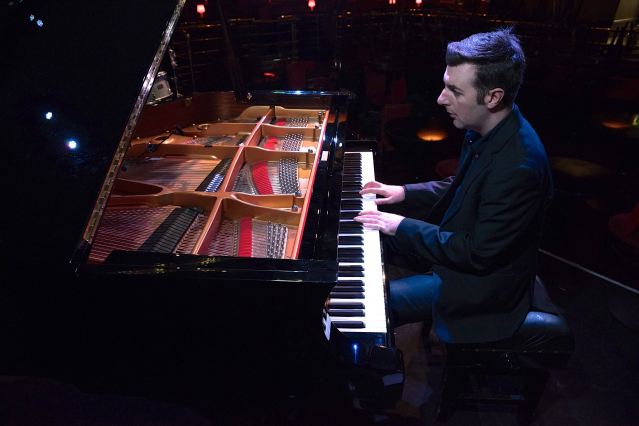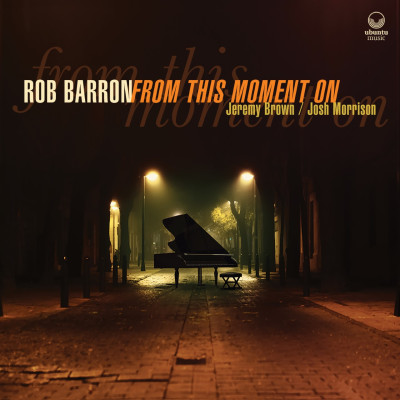By londonjazz on • ( Leave a comment )
Rob Barron has a new trio album out. ‘From This Moment On’ is on Ubuntu Music. It is his second as leader. Interview by John Fordham:

Image © Benjamin Amure. 2015
Maybe a contrarian streak can lead a jazz musician to swim against contemporary stylistic tides and go back to the most traditional models for inspiration, but for the most skilfully inventive performers it’s a more affirmative impulse – inspired by the new possibilities hidden within the most familiar sounds for every new generation of players and audiences, and the pleasures that teasing them out can bring. The Yorkshire-born pianist, arranger and composer Rob Barron, one of the UK’s most versatile exponents of that creative-traditionalist’s art, elegantly showcases it this month on the new album.
Over the past decade, Barron has been busily content to enhance the work of others rather than draw the spotlight toward his own. He has shared his sleek and skilful bop-rooted artistry with US jazz legends including Benny Golson and the late Al Jarreau, contributed as a player and composer to director Baz Lurhmann’s 2013 movie adaptation of ‘The Great Gatsby’, toured with the English National Ballet’s ‘Strictly Gershwin’, kept up a headlong schedule as a session musician, and still found time to regularly occupy the piano chair with the Ronnie Scott’s Jazz Orchestra and make his trio a familiar attraction at the club’s legendary Late Show. Now Barron, flanked by his gracefully attentive long-running partners Jeremy Brown (bass) and Josh Morrison (drums) signals his growing confidence as a leader by making a piano-trio album, venturing into a crowded field dominated by such formidable role-models as Bill Evans, Hank Jones, Keith Jarrett and Brad Mehldau. Audacious rhythm-shifting reinventions of classics like ‘In A Sentimental Mood’ and ‘As Time Goes By’ mingle with hurtling bebop swingers like Oliver Nelson’s ‘Butch and Butch’ or Barron’s own ‘Evidently’. The lyricism of the leader’s composing muse is palpable in ‘Fortune Green’ (a softly swaying theme that sounds like an invitation to an absent vocalist), and the patient shapeliness of the piano improvisations and the collective empathy of the trio give the whole classy set a coolly understated eloquence.
‘When the lockdown happened in March, it was hard to accept not playing live of course, but I did think “well, now’s the time to get this record released and for this music to be heard”,’ Rob Barron reflects. ‘The lyrics of Cole Porter’s “From This Moment On” also seemed to represent hope for a better time beyond the uncertain one we were entering – “from this moment on, no more blue songs” – and I guess it expressed feelings so many people were having about a brighter future beyond all this. So that became the title theme. Maybe it also said something about the musical bond between Jeremy and Josh and me in this trio, and how energised by it we were all feeling.’
‘From This Moment On’ is a striking landmark in a career that began with piano studies from five years old, moved on to youth big bands and early exposure on the Hull jazz scene with a jazz-funky jam band called Jazz Soup – in which, as Barron puts it, ‘we were all experimenting and guessing, just having a go’. He enrolled for the pioneering jazz course at Leeds Conservatoire (the first jazz degree in Britain), studying there with two of the UK’s most influential performer-teachers in pianists Les Chisnall and Mark Donlon, and from 2004 at London’s Guildhall School of Music and Drama with the eclectic Simon Purcell, who would win the Parliamentary Jazz Appreciation Group’s Jazz Educator of the Year award in that decade.
Reflecting on his education in music, Robert Barron says: ‘I did a lot of gigging in all kinds of music when I was at Leeds, but I felt I hadn’t found my niche in those days, I didn’t find out how I wanted to sound until later. The course was pretty good at teaching you to be an employable musician, but perhaps it didn’t get into the nooks and crannies of bebop and swing. When I came to London in 2004 as a postgrad student at the Guildhall, I didn’t get to explore those things then either, and my peer group were into more contemporary jazz and performing their own music. But I was inspired by Simon Purcell’s passion for jazz education, and a more academic and theoretical approach that was different from the performance-based course at Leeds. I think I learned from all of it, and from playing with singers like Anita Wardell and Tina May, who were very good to me in those days and opened my ears to songs.’
In the early 2000s, Rob Barron became involved with some of the leading younger-generation figures of a vibrant London jazz scene that saw the founding of the innovative Loop Collective, and the formation of a raft of new groups bridging experimental jazz, contemporary-classical music and free-improvisation. He shared a house with the saxophonist and Loop Collective co-founder Mark Hanslip and John Taylor-influenced pianist John Turville, and played with saxophonist/composer Adam Waldmann on ‘Kairos Moment’, the debut album by Waldmann’s MOBO-winning chamber group, Kairos4tet.
‘But I didn’t really feel I was the right piano player for that band, and to be honest I don’t think Adam did either,’ Barron chuckles. ‘A lot of London musicians were super into the rhythmic side of jazz at that time, and I was more into harmony and the tradition of song-based swing. But in that period I also met people who were passionate about American-sounding jazz, like the drummer Steve Brown. Between arriving in London in 2004, playing with NYJO (National Youth Jazz Orchestra) through that decade, and then starting to visit New York to study with pianists like David Hazeltine and Michael Weiss, I started to join the dots together. At college, most pianists I knew tended to go straight in to piano jazz at Bill Evans, and of course Keith Jarrett – whose Standards Trio was a huge influence then. There’s a pure beauty in that way of playing, of course it’s wonderful. But I wanted to go back to people like Hank Jones, Wynton Kelly, and Cedar Walton, who had come out of the Bud Powell line. I loved the way they made the melodies dance, and that’s why I took what the Americans call a deep dive into those methods. Cedar has also been a big influence on my arranging style – particularly in suggesting different rhythmic approaches to familiar songs – and his way of uptempo improvising, manipulating short phrases and small amounts of material in so many ways, has been such an inspiration to me as a soloist’.
Walton, a former member of Art Blakey’s legendary Jazz Messengers, became a revered explorer of the piano trio format – a classic jazz vehicle embracing the work of Nat King Cole, Ahmad Jamal, Bill Evans, Keith Jarrett, McCoy Tyner, Chick Corea and Brad Mehldau, all the way up to genre-bending 21st-century threesomes like The Bad Plus. But if he was well aware of the pedigree of his predecessors, Rob Barron was finally sure he was ready to join in.
‘It’s a big step, to put yourself out there in such a crowded field,’ Barron acknowledges. ‘My first album, “What’s In Store” was a quartet with the trio and Colin Oxley on guitar, and back then I didn’t feel quite ready for the exposure of a trio, and I really liked playing with Colin too. Four years later, and I feel we’re ready to put our own stamp on it. Josh and I have played together for ten years now, we listen to the same music, like Cedar Walton’s trio with Billy Higgins, and Josh can shape the arrangements I bring very well. And he and Jeremy had played for a long time in Stacey Kent’s band, so they had a close affinity from that. But Martin Hummel from Ubuntu Music was crucial to getting things moving. I’d had some initial meetings with him at the beginning of the year and sent him our recordings – he liked what he heard, was keen to put the album out, and helped us so much with getting an artwork designer, dealing with royalties and the MCPS, and getting several of the tracks selected for streaming on Spotify. Ubuntu also have a very open roster, from modern rock-jazz to straightahead, so it felt good to work with a label like that.’

Though there are two deft Barron originals on the tracklist of ‘From This Moment On’, the emphasis is on the standards songbook – true to the pianist’s devotion to an era in which the shapely symmetries of timeless Tin Pan Alley and Broadway tunes fed endless inspiration to jazz improvisers. Yet creatively remaking them for both the stalwarts and the newcomers of today’s jazz audience constantly drove Rob Barron’s conception of the repertoire.
‘Leslie Bricusse’s “Pure Imagination” was the first arrangement I did for this album,’ Barron says. ‘It’s a beautiful melody, and it’s good to have some songs with a strong melodic line but not a lot of eighth notes, because then you can do more with the harmony. I did “As Time Goes By” with a 12/8 feel, which came from a drum groove I had in mind for it, but the improv part is in 4/4. The originals “Fortune Green” and Evidently” I wrote last, about a month before the recording – and although I’ve tended to think of myself as a player and arranger more than a natural composer, they’ve made me want to compose more, maybe for a slightly larger ensemble – I’ve done a few gigs adding Nat Steele on vibes and Colin (Oxley) on guitar, and although some people maybe expect a George Shearing night when they hear that, I’ve got other ideas for it. A quartet with tenor sax is also on the cards. I feel the music I’ve played for so long, so many classic compositions with such wonderful melodies, has given me a lot to work with.’
PP features are part of advertising packages
Rob Barron’s ‘From This Moment On’ is out now on Ubuntu Music UBU0064.